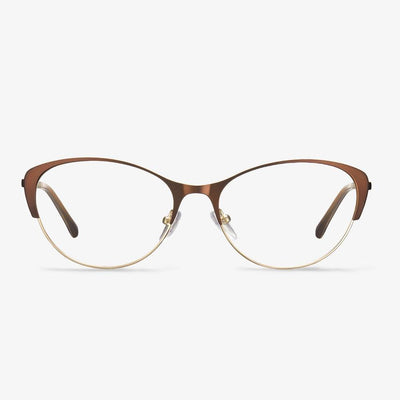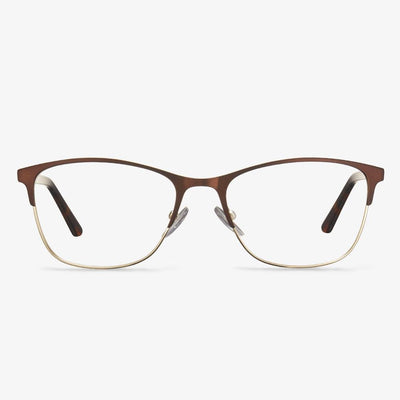Adjust the nose pad
The height of the nose pad is adjusted by first holding the glasses with one hand and holding the nose pad with pliers with the other. Then the pliers are lifted up and the nose pad is moved down until the glasses are in the correct position on the face. The asymmetrical adjustment method is to first hold the frame of the eyeglasses with one hand, the other hand clamps the nasal plate with pliers. Then twist it in the direction of the correct tray position so that the surface of the tray is in contact with the two sides of the nose. Wrap one side of the lens of the glasses to be operated with a cloth first to prevent the screwdriver from slipping and scraping the lens during the operation. Don't scratch your glasses by adjusting your nose pad.
Who should wear blue light glasses?
Teenagers, middle-aged and old people need to wear blue light glasses. The lens of a teenager is clear, pure, and still developing. Their eyes are less resistant to blue light than adults and are more vulnerable to long-term exposure to blue light, which can promote the development of myopia. Teenagers study more nervous, are free to love to play computer games, love to watch TV programs. Blue light damage can be said to be everywhere. As a result, teenagers are among the biggest victims of blue light. Macular degeneration is a common disease in the elderly, usually occurring after the age of 45, and the incidence increases with age. Blue light can accelerate the progression of macular degeneration, especially in patients following cataract surgery. Blue-blocking glasses are still the best preventative measure.
How to Adjust Glasses If They Pinch Your Nose
In some cases, glasses will pinch your nose, so you also need to adjust them, too. If the glasses frames are metal, you should simply widen the plastic nose pads using your thumbs until the frames fit comfortably. If the glasses frames are plastic, you should soak the arms of your glasses in warm water for 30-60 seconds, and gently apply upward and outward pressure on the end of the arms to get a more relaxed fit.
After that, your glasses will become more suitable.
Unfortunately, not all glasses can be adjusted by yourself at home. You can’t adjust some glasses which are based on the material of your glasses. For example, the glasses with the following material can’t be adjusted at home:
1. Aluminum alloy.
2. Memory plastic.
3. Titanium or memory titanium.
If your glasses are made of these materials, you can’t adjust them by yourself at home. If something goes worse, you need to buy a new pair of glasses. It is also risky to adjust the rimless or semi-rimless glasses by yourself at home.
As for how to tighten glasses or how to adjust glasses, you may have brief knowledge after reading this post. If your glasses are already broken or you want to get a pair of new glasses, you can try Koalaeye Optical, which is cheap and has a free shipping service.
39Dollar Glasses
39DollarGlasses was developed by ophthalmologists to provide people with an inexpensive way to get high-quality finished prescription glasses.
They use the same high-quality materials, but because of their large volume, they offer a high discount because they have no additional overhead limits. Elastic glasses are made of high-quality titanium, one of the strongest metals on Earth. For you, that means your bent titanium glasses won't rust or break easily. Looking stylish and active, when you buy a pair of elastic glasses on 39DollarGlasses, your prescription glasses include full UV protection, and the thin and light lenses can be customized to your needs.
How to choose blue light blocking glasses?
Look at lens color. Ordinary lens and blue light blocking lens is the same yellow-green film, and they can be placed in light to identify the place.
Regular lenses have a yellowish tinge in the reflection of light. And anti-blue light glasses film color, there is the blue color in the yellow and green film, this is because of the reflection of blue light.
Look at the instructions. Check the specs and test reports of glasses. Look at the lens manufacturer's qualifications and whether the lens contains radiation.
The history of chromatic contact lenses
Chromatic contact lenses, commonly known as color Lens, is a kind of Soft hydrophilic Contact Lens, belongs to the third category of medical devices. In 1971, Bausch & Lomb introduced the world's first pair of soft contact lenses. Before this, contact lenses are made of hard materials, with poor comfort, difficult to promote. Soon after, CIBA Vision made the lenses aqua blue to make them easier for users to operate. There were also special contact lenses with dark loops on the lenses, which were designed to help people with injured or defective eyes, like corneal white spots or iris defects, to conceal flaws, forming artificial pupils, so they were called beauty lenses.
Then, in the 1980s, American company Wesley Jessen (later bought by VisiCon) introduced the FreshLook chromatic contact lens, which used laser technology to print colored patterns onto the lens to change the color of the wearer's iris. Since then, contact lenses have been developed from a simple vision correction tool into a cosmetic with the effect of beauty makeup. It can brighten, enlarge, darken or change the color of the iris of the eye. At present, the common chromatic contact lenses are black, brown, gray, purple, blue, green, and so on. There are also a variety of color combinations or some special patterns.
How to Find Reading Glasses Strengths?
Some reading glasses also come with strengths. So, how do you know what strength reading glasses to get and how to find reading glasses strengths? The strength of all reading glasses is measured in dioptre, with units increasing by 0.25 dioptre depending on the power of the lens.
The reading glasses strengths range from +0.75 dioptre to +3.00 dioptre. Both lenses have the same power which is indicated by a permanent marking on the inside of the frame or with a removable sticker on the lens. So, you can find the reading glasses strengths of the glasses.
The important thing you need to notice is that when higher the number, the greater the power of the lenses is when choosing reading glasses. So, glasses with a marking of 1.0 are low power while those marking +3.0 are high powered.











































